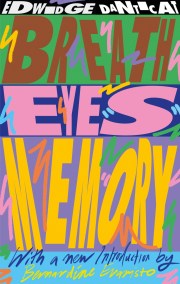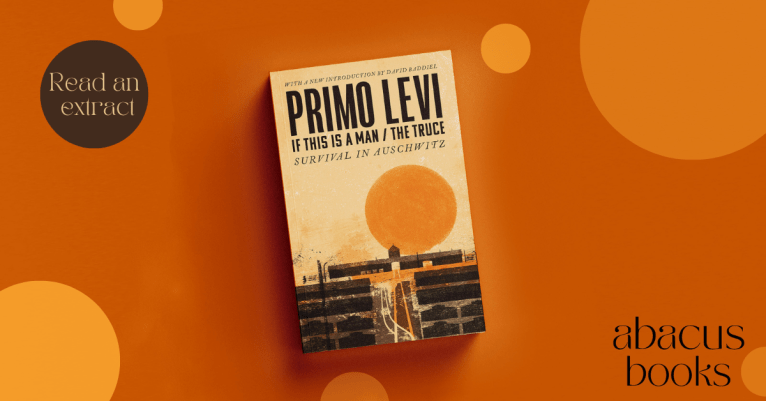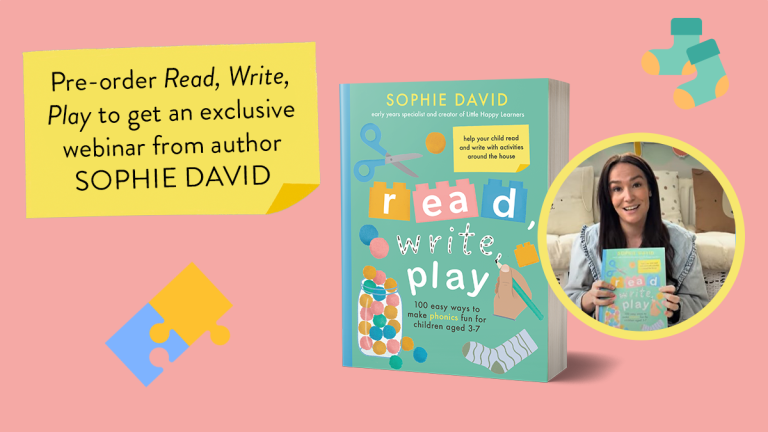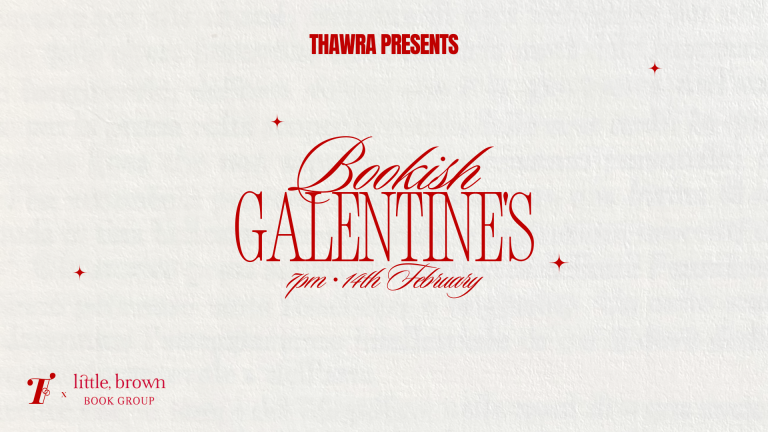Read an extract from Breath, Eyes, Memory by Edwidge Danticat
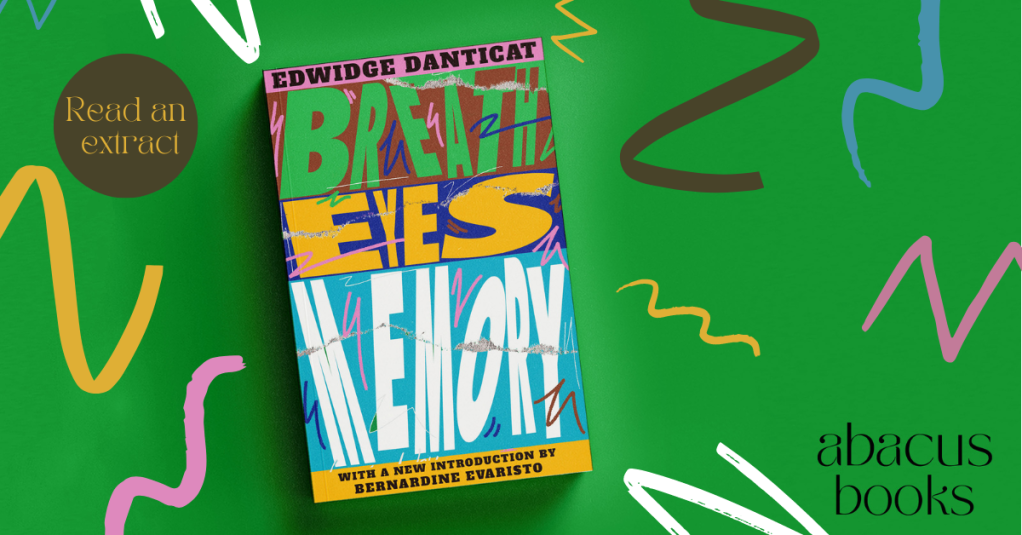
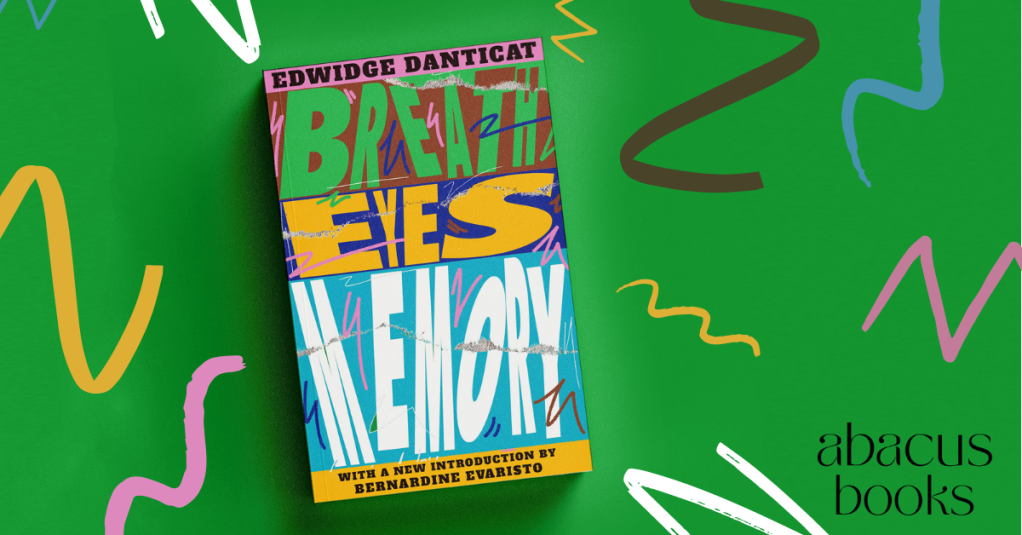
Edwidge Danticat’s groundbreaking debut, with new introduction from Booker Prize winner Bernardine Evaristo.
An Oprah Book Club selection
‘A vision of female solidarity which transcends place and time’ Sunday Times
‘A novel that rewards the reader again and again with small but exquisite and unforgettable epiphanies’ Washington Post
‘Extraordinarily successful’ New York Times Book Review
‘A first novel of precious humanity’ Independent
1
A flattened and drying daffodil was dangling off the little card that I had made my aunt Atie for Mother’s Day. I pressed my palm over the flower and squashed it against the plain beige cardboard. When I turned the corner near the house, I saw her sitting in an old rocker in the yard, staring at a group of children crushing dried yellow leaves into the ground. The leaves had been left in the sun to dry. They would be burned that night at the konbit potluck dinner.
I put the card back in my pocket before I got to the yard. When Tante Atie saw me, she raised the piece of white cloth she was embroidering and waved it at me. When I stood in front of her, she opened her arms just wide enough for my body to fit into them.
“How was school?” she asked, with a big smile.
She bent down and kissed my forehead, then pulled me down onto her lap.
“School was all right,” I said. “I like everything but those reading classes they let parents come to in the afternoon. Everybody’s parents come except you. I never have anyone to read with, so Monsieur Augustin always pairs me off with an old lady who wants to learn her letters, but does not have children at the school.”
“I do not want a pack of children teaching me how to read,” she said. “The young should learn from the old. Not the other way. Besides, I have to rest my back when you have your class. I have work.”
A blush of embarrassment rose to her brown cheeks.
“At one time, I would have given anything to be in school. But not at my age. My time is gone. Cooking and cleaning, looking after others, that’s my school now. That schoolhouse is your school. Cutting cane was the only thing for a young one to do when I was your age. That is why I never want to hear you complain about your school.” She adjusted a pink head rag wrapped tightly around her head and dashed off a quick smile revealing two missing side teeth. “As long as you do not have to work in the fields, it does not matter that I will never learn to read that ragged old Bible under my pillow.”
Whenever she was sad, Tante Atie would talk about the sugar cane fields, where she and my mother practically lived when they were children. They saw people die there from sunstroke every day. Tante Atie said that, one day while they were all working together, her father – my grandfather – stopped to wipe his forehead, leaned forward, and died. My grandmother took the body in her arms and tried to scream the life back into it. They all kept screaming and hollering, as my grandmother’s tears bathed the corpse’s face. Nothing would bring my grandfather back.
The bòlèt man was coming up the road. He was tall and yellow like an amber roach. The children across the road lined up by the fence to watch him, clutching one another as he whistled and strolled past them.
This albino, whose name was Chabin, was the biggest lottery agent in the village. He was thought to have certain gifts that had nothing to do with the lottery, but which Tante Atie believed put the spirits on his side. For example, if anyone was chasing him, he could turn into a snake with one flip of his tongue. Sometimes, he could see the future by looking into your eyes, unless you closed your soul to him by thinking of a religious song and prayer while in his presence.
I could tell that Tante Atie was thinking of one of her favorite verses as he approached. Death is the shepherd of man and in the final dawn, good will be the master of evil.
“Honour, mes belles, Atie, Sophie.”
Chabin winked at us from the front gate. He had no eyelashes – or seemed to have none. His eyebrows were tawny and fine like corn silk, but he had a thick head of dirty red hair.
“How are you today?” he asked.
“Today, we are fine,” Tante Atie said. “We do not know about tomorrow.”
“Ki niméro today?” he asked. “What numbers you playing?”
“Today, we play my sister Martine’s age,” Tante Atie said.
“Sophie’s mother’s age. Thirty-one. Perhaps it will bring me luck.”
“Thirty-one will cost you fifty cents,” he said.
Tante Atie reached into her bra and pulled out one gourde.
“We will play the number twice,” she said.
Even though Tante Atie played faithfully, she had never won at the bòlèt. Not even a small amount, not even once.
She said the lottery was like love. Providence was not with her, but she was patient.
The albino wrote us a receipt with the numbers and the amount Tante Atie had given him.
The children cringed behind the gate as he went on his way. Tante Atie raised her receipt towards the sun to see it better.
“Therem he wrote your name,” I said pointing to the letters, “and there, he wrote the number thirty-one.”
She ran her fingers over the numbers as though they were quilted on the paper.
“Would it not be wonderful to read?” I said for what must have been the hundredth time.
“I tell you, my time is passed. School is not for people my age.”
The children across the street were piling up the leaves in Madame Augustin’s yard. The bigger ones waited on line as the smaller ones dropped onto the pile, bouncing to their feet, shrieking and laughing. They called one another’s names: Foi, Hope, Faith, Espérance, Beloved, God-Given, My Joy, First Born, Last Born, Asefi, Enough-Girls, Enough-Boys, Deliverance, Small Misery, Big Misery, No Misery. Names as bright and colorful as the giant poincianas in Madame Augustin’s garden.
They grabbed one another and fell to the ground, rejoicing as though they had flown past the towering flame trees that shielded the yard from the hot Haitian sun.
“You think these children would be kind to their mothers and clean up those leaves,” Tante Atie said. “Instead, they are making a bigger mess.”
“They should know better,” I said, secretly wishing that I too could swim in their sea of dry leaves.
Tante Atie threw her arms around me and squeezed me so hard that the lemon-scented perfume, which she dabbed across her chest each morning, began to tickle my nose.
“Sunday is Mother’s Day, non?” she said, loudly sucking her teeth. “The young ones, they should show their mothers they want to help them. What you see in your children today, it tells you about what they will do for you when you are close to the grave.”
I appreciated Tante Atie, but maybe I did not show it enough. Maybe she wanted to be a real mother, have a real daughter to wear matching clothes with, hold hands and learn to read with.
“Mother’s Day will make you sad, won’t it, Tante Atie?”
“Why do you say that?” she asked.
“You look like someone who is going to be sad.”
“You were always wise beyond your years, just like your mother.”
She gently held my waist as I climbed down from her lap. Then she cupped her face in both palms, her elbows digging into the pleats of her pink skirt.
I was going to sneak the card under her pillow Saturday night so that she would find it as she was making the bed on Sunday morning. But the way her face drooped into her palms made me want to give it to her right then.
I dug into my pocket, and handed it to her. Inside was a poem that I had written for her.
She took the card from my hand. The flower nearly fell off. She pressed the tape against the short stem, forced the baby daffodil back in its place, and handed the card back to me. She did not even look inside.
“Not this year,” she said.
“Why not this year?”
“Sophie, it is not mine. It is your mother’s. We must send it to your mother.”
I only knew my mother from the picture on the night table by Tante Atie’s pillow. She waved from inside the frame with a wide grin on her face and a large flower in her hair. She witnessed everything that went on in the bougainvillea, each step, each stumble, each hug and kiss. She saw us when we got up, when we went to sleep, when we laughed, when we got upset at each other. Her expression never changed. Her grin never went away.
I sometimes saw my mother in my dreams. She would chase me through a field of wildflowers as tall as the sky. When she caught me, she would try to squeeze me into the small frame so I could be in the picture with her. I would scream and scream until my voice gave out, then Tante Atie would come and save me from her grasp.
I slipped the card back in my pocket and got up to go inside. Tante Atie lowered her head and covered her face with her hands. Her fingers muffled her voice as she spoke.
“When I am done feeling bad, I will come in and we will find you a very nice envelope for your card. Maybe it will get to your mother after the fact, but she will welcome it because it will come directly from you.”
“It is your card,” I insisted.
“It is for a mother, your mother.” She motioned me away with a wave of her hand. “When it is Aunt’s Day, you can make me one.”
“Will you let me read it to you?”
“It is not for me to hear, my angel. It is for your mother.”
I put the card back in my pocket, plucked out the flower, and dropped it under my shoes.
Across the road, the children were yelling each other’s names, inviting passing friends to join them. They sat in a circle and shot the crackling leaves high above their heads. The leaves landed on their faces and clung to their hair. It was almost as though they were caught in a rain of daffodils.
I continued to watch the children as Tante Atie prepared what she was bringing to the potluck. She put the last touches on a large tray of sweet potato pudding that filled the whole house with its molasses scent.
As soon as the sun set, lamps were lit all over our quarter. The smaller children sat playing marbles near whatever light they could find. The older boys huddled in small groups near the school yard fence as they chatted over their books. The girls formed circles around their grandmothers’ feet, learning to sew.
Tante Atie had promised that in another year or so she would teach me how to sew.
“You should not stare,” she said as we passed a near-sighted old woman whispering mystical secrets of needle and thread to a little girl. The girl was squinting as her eyes dashed back and forth to keep up with the movements of her grandmother’s old fingers.
“Can I start sewing soon?” I asked Tante Atie.
“Soon as I have a little time,” she said.
She put her hand on my shoulder and bent down to kiss my cheek.
“Is something troubling you?” I asked.
“Don’t let my troubles upset you,” she said.
“When I made the card, I thought it would make you happy. I did not mean to make you sad.”
“You have never done anything to make me sad,” she said. “That is why this whole thing is going to be so hard.”
A coo
l evening breeze circled the dust around our feet.
“You should put on your blouse with the long sleeves,” she said. “So you don’t catch cold.”
I wanted to ask her what was going to be so hard, but she pressed her finger over my lips and pointed towards the house.
She said “Go” and so I went.
Discover the book:

